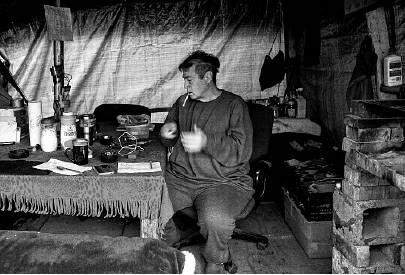EDITORIAL
A lesson in housing
Trump can learn from Houston’s solutions on how to address problem of homelessness.
On a typical night in America, nearly half a million people experience homelessness. In a given year, 1.4 million spend time in a shelter.
That so many of our fellow Americans are without a permanent place to live should concern us all. The problem of homelessness is serious, stubborn and complex, so it’s commendable when elected officials call attention to the issue and seek real, lasting solutions.
We’re not sure that’s what President Donald Trump was doing when he blamed the homeless for ruining the “prestige” of addresses in California by living on the “best highways, our best streets, our best entrances to buildings.” Or when he directed the Environmental Protection Agency to fine San Francisco for environmental violations related to homelessness.
Certainly, California, even accounting for its size, has an alarming homeless problem. Nearly half of the nation’s unsheltered population — people sleeping on sidewalks, parks and abandoned buildings — lives in the state.
Potential solutions tossed out by the Trump administration — razing tent cities, putting the homeless in government facilities, using police to get people off the street — are widely seen as harmful or ineffective by advocates.
If the White House is truly committed to eradicating homelessness, we have a suggestion: Look at Houston.
Over the past eight years, the Houston region, which includes Fort Bend and Montgomery counties, has seen a 54 percent decrease in the homeless population, according to the Point-in-Time Count, a census done every January across the country. In 2011, about 8,500 homeless people were counted; this year, there were 3,900.
During that time frame, 17,000 formerly homeless people have been housed in permanent supportive housing, said Michael Nichols, interim president and CEO of the Coalition for the Homeless.
Even more impressive: Nearly 90 percent were still in housing a year later.
The number of homeless had been steadily dropping until 2018, after Hurricane Harvey stalled progress for a time.
Even so, while other cities are experiencing increases in homelessness, Houston has succeeded in getting people out of shelters and off the street.
What has worked?
• A coordinated effort to solve homelessness, called The Way Home, which encompasses more than 100 agencies, including the city of Houston, the counties, nonprofit agencies, businesses and the U.S. Department of Housing and Urban Development, and is led by the Coalition for the Homeless. It also includes a police force that Nichols says is interested in helping, not criminalizing, the homeless.
• A “housing first” approach that prioritizes getting people into permanent housing and providing voluntary wraparound services to keep them there.
• Partnerships with the city and Harris County housing authorities that provide long-term housing vouchers, which allow funding to be used for other services.
• A joint campaign with the Department of Veterans Affairs to focus on military veterans, who make up about 9 percent of the country’s homeless. It began in 2011 with the goal of finding permanent homes for 100 veterans in 100 days. Three years later, 3,650 veterans had homes.
While encouraging, more needs to be done. The homeless remaining are increasingly visible, pushed out by development of bayous and empty warehouses where they had lived unseen. They are among the most vulnerable and challenging, grappling with chronic illnesses and substance abuse.
The criminal justice and mental health systems still serve as pipelines to homelessness, as people are released from custody and hospitalization without housing or respite care. The money saved by keeping people out of jail through diversion programs can help fund support to prevent homelessness.
Houston, like most cities, also needs more affordable housing, more incentives for developers to build it and penalties for landlords who shun housing vouchers.
Some of Trump’s other proposals — cutting federal housing dollars, barring households that may include someone in the U.S. illegally from housing assistance and allowing shelters to reject transgender people — will only make things worse. If the president really wants to fix homelessness, Houston is an able teacher.
